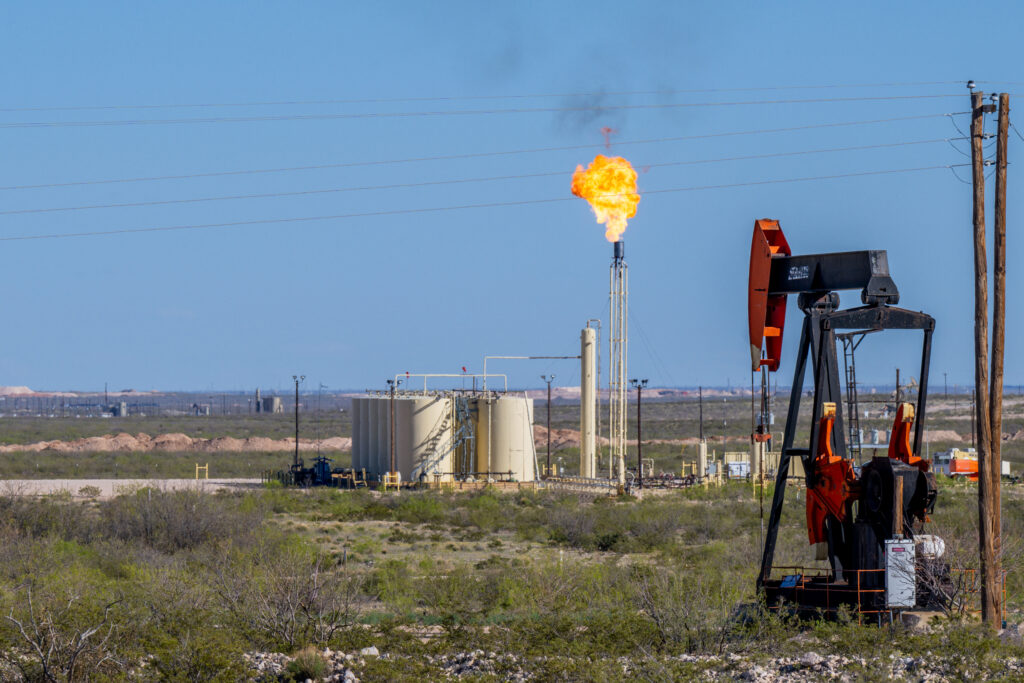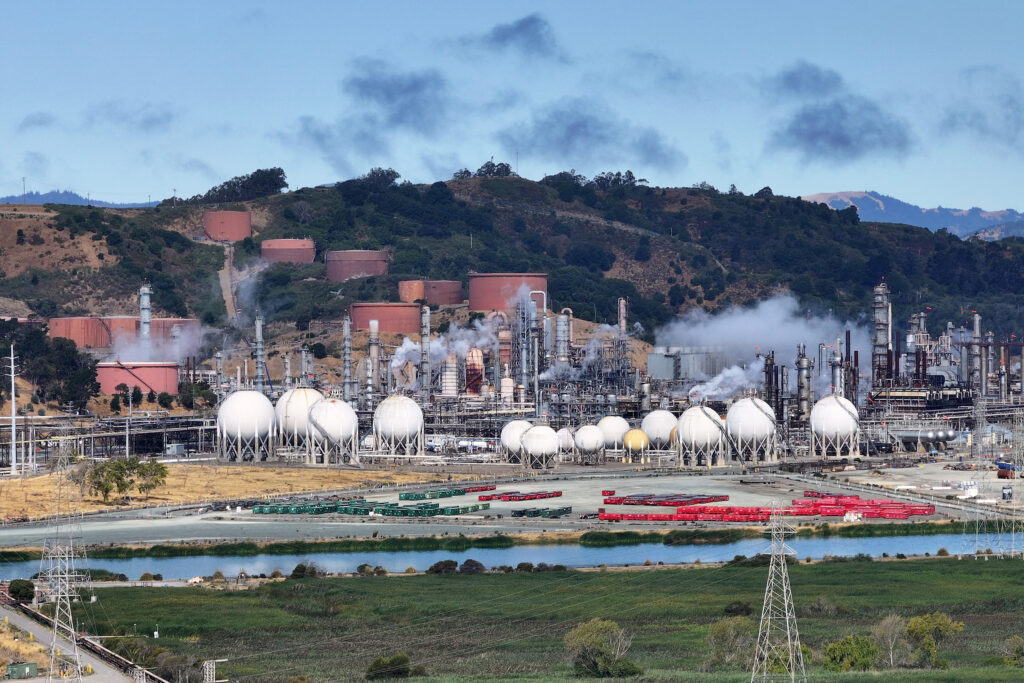Fears that the Trump administration is looking for ways to lift a longstanding ban on fracking for natural gas in the densely populated Delaware River Basin—which includes part of Pennsylvania—have prompted environmentalists to seek public support for a commitment to defend the regulation.
Activists are promoting a “Pledge of Resistance and Protection” of the watershed in response to what they see as a series of attempts by the administration and some of its supporters in Congress to hobble the Delaware River Basin Commission, an interstate agency that formally banned fracking in the region in 2021 after a moratorium that began a decade earlier.
“The Delaware River frack ban was put in place with public participation, backed by science and fact to be protective of the Delaware River watershed and its communities,” the pledge says in part. “We must continue to stand strong for our environment, and to uphold the pillars of law, science and facts that helped the DRBC make the sound decision that the watershed will not survive, nor will we, if fracking is allowed.”
The Trump administration hasn’t made specific moves to target the ban. But environmentalists’ confidence in the rule has been shaken after multiple actions by President Donald Trump to increase fossil fuel production, including declaring an “energy emergency” and directing agencies to roll back federal policies that “impose an undue burden on the identification, development, or use of domestic energy resources” such as natural gas.
Environmentalists were further spooked after U.S. Rep. Rob Bresnahan, a new Republican congressman from northeast Pennsylvania, introduced a bill in May that would require a federal review of the DRBC and other commissions in the Mid-Atlantic, including responsibilities that overlap with federal obligations, and recommend any reforms. Bresnahan criticized the fracking ban earlier this year at the event attended by the head of the U.S. Environmental Protection Agency.
The Delaware River Basin extends across four states, but only two—Pennsylvania and New York—also contain the gas-rich Marcellus Shale. New York banned fracking statewide in 2014, citing health risks.
Environmentalists say that allowing the industry to drill in Pennsylvania’s part of the watershed would risk contaminating drinking water for some 15 million people, including in Philadelphia and Trenton, New Jersey, with toxic chemicals used in fracking. The critics point to many instances of air and water pollution in heavily fracked areas such as southwest Pennsylvania, and they say that increased production will also worsen climate change.
The gas industry says it protects drinking-water aquifers from fracking chemicals by encasing drills in multiple layers of steel and concrete, and complies with all state and federal laws on fracking safety.
Pennsylvania’s gas industry and its supporters in the state legislature have unsuccessfully fought the DRBC’s frack ban through legislation and litigation for years, arguing that landowners in two watershed counties should be allowed to lease their property to companies active in the rest of the state’s Marcellus Shale. In February, a federal judge dismissed a suit by landowners in Wayne County, northeast of Scranton, seeking to overturn the DRBC’s fracking ban in their area.
The Marcellus Shale Coalition, which represents Pennsylvania’s natural gas industry, said it wants the Delaware River Basin fracking ban to be lifted, but has not “formally communicated” with the Trump administration on the issue.
“The Marcellus Shale Coalition strongly supports lifting the DRBC’s unjust ban on safe, responsible natural gas development. This ban has long violated the property rights of Pennsylvania landowners and ignores nearly two decades of demonstrated, highly regulated shale development in the Commonwealth—including in the neighboring Susquehanna River Basin,” coalition spokesman Patrick Henderson said in a statement.
Still, a study released in 2019 by the University of Delaware found that the watershed represents only 3.3 percent of the Marcellus Shale. The study found that the financial value of potentially recoverable natural gas in that part of the field is dwarfed by the estimated value of the area’s drinking water supply, forests and recreation.
“The value, not just economic but civic and ecological, is many times more than the small amount of gas that’s up there,” said Jerry Kauffman, director of the University of Delaware’s Water Resources Center and one of the authors of the report. “The gas, which is a fossil fuel, is a non-renewable resource that can be exhausted pretty quickly. Protect the drinking water first because it’s much more valuable.”
This story is funded by readers like you.
Our nonprofit newsroom provides award-winning climate coverage free of charge and advertising. We rely on donations from readers like you to keep going. Please donate now to support our work.
Donate Now
In banning fracking, the DRBC “acted appropriately” to protect the interests of the people who live in the watershed, Kauffman said. He plans to update the study this year.
One Trump administration move involving the DRBC added to environmentalists’ jitters that more might be coming. The agency’s federal representative, the U.S. Army Corps of Engineers, proposed a resolution last month to end future federal funding for DRBC work on climate change, and for its policy of diversity, equity and inclusion, or DEI. The resolution was unanimously approved by governors of the watershed states—New Jersey and Delaware in addition to Pennsylvania and New York, all run by Democratic administrations.
The surprising agreement prompted speculation that the governors were picking their battles with Trump. The federal government has mostly failed to pay its share of DRBC’s running costs since the 1980s, and so the funding cut would have little effect.
DRBC’s executive director, Kristen Kavanagh, said the agency has received no federal funding through the Army Corps since the resolution. But she said the DRBC’s Advisory Committee on Climate Change, a panel of 18 experts, including academics and water-company executives, will continue its work. Its next scheduled meeting is Aug. 27.
Bresnahan’s commission review bill, meanwhile, has advanced in committee and awaits a full vote in the House.
His office did not respond to a request for comment on the reasons for the bill. But Tracy Carluccio with the Delaware Riverkeeper Network, who instigated the pledge, called the legislation a ploy to interfere with the running of an agency that has prompted a sharp improvement in water quality since its inception in 1961, and reinforced that through its ban on fracking.
“This attempt to poke around the DRBC’s inner workings is nothing more than a politically motivated witch hunt, designed to intimidate and disrupt the DRBC,” Carluccio said.
DRBC spokespeople declined to comment on the bill.
The U.S. Environmental Protection Agency also did not respond to requests for comment. But its administrator, Lee Zeldin, attended a meeting in Northeast Pennsylvania with Bresnahan and some pro-fracking state lawmakers in March, according to a press release from the congressman and a story from the River Reporter, a news site in a New York community just over the Pennsylvania state line.
Asked there whether the Trump administration would try to open up drilling in Northeast Pennsylvania, Zeldin said, “President Trump is someone I feel confident we can approach [with] any good idea [and] his response is going to be that he wants to get it done as quickly as possible,” the news site reported.
If the Trump administration finds a way to lift the Delaware Basin frack ban, it will also find activists pledged to resist it, said Carluccio. By mid-July, the document had about 1,100 signers online.
“We have found that people want to make positive commitments that affirm personal power,” she said. “The pledge is like an oath or a vow founded on a person’s allegiance to the issue. We know that there is strong and resolute dedication from people to never allowing fracking to occur here and the pledge is a public statement that each person makes to stake their ground.”
About This Story
Perhaps you noticed: This story, like all the news we publish, is free to read. That’s because Inside Climate News is a 501c3 nonprofit organization. We do not charge a subscription fee, lock our news behind a paywall, or clutter our website with ads. We make our news on climate and the environment freely available to you and anyone who wants it.
That’s not all. We also share our news for free with scores of other media organizations around the country. Many of them can’t afford to do environmental journalism of their own. We’ve built bureaus from coast to coast to report local stories, collaborate with local newsrooms and co-publish articles so that this vital work is shared as widely as possible.
Two of us launched ICN in 2007. Six years later we earned a Pulitzer Prize for National Reporting, and now we run the oldest and largest dedicated climate newsroom in the nation. We tell the story in all its complexity. We hold polluters accountable. We expose environmental injustice. We debunk misinformation. We scrutinize solutions and inspire action.
Donations from readers like you fund every aspect of what we do. If you don’t already, will you support our ongoing work, our reporting on the biggest crisis facing our planet, and help us reach even more readers in more places?
Please take a moment to make a tax-deductible donation. Every one of them makes a difference.
Thank you,
















